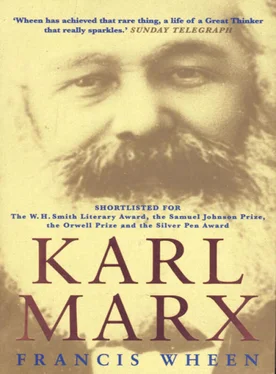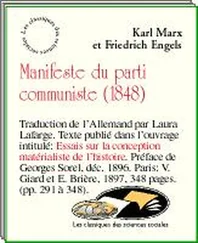Marx had promised the Belgian authorities not to publish anything on current politics, but thought he was quite within his rights to participate in politics and to pursue his studies in economic history. Hence the summons to Engels, by now an indispensable lieutenant. In the summer of 1845 the two men paid a six-week visit to England, partly to take advantage of the well-stocked libraries in Manchester and London but also to meet the leaders of the Chartists, the first working-class movement in the world. On their return, Engels rented a house next door to the Marxes and set about organising the socialist flotsam of Brussels into a comparable political force.
First, however, there was the small matter of Marx’s book. The research trip to Britain and the long hours he spent in Brussels’s municipal library must have raised the hopes of his publisher, Karl Leske, who was expecting the Critique of Economics and Politics by the end of the summer. But Marx had already set the manuscript aside after writing no more than a table of contents. ‘ It seemed to me very important,’ he explained to Leske, ‘to precede my positive development with a polemical piece against German philosophy and German socialism up till the present. This is necessary in order to prepare the public for the viewpoint adopted in my Economy, which is diametrically opposed to German scholarship past and present … If need be, I could produce numerous letters I have received from Germany and France as proof that this work is most eagerly awaited by the public.’
Not so: his ‘polemical piece’, The German Ideology , didn’t find a publisher until 1932. The only public demand for it came from Marx himself, who was now being caricatured by the Young Hegelians as an unthinking disciple of Ludwig Feuerbach. This infuriated him: Feuerbach’s demystification of Hegel had indeed been a glorious moment of revelation, like Keats’s first glimpse of Chapman’s Homer, but Marx had long since concluded that the critique merely substituted one myth for another. Feuerbach, the man who had turned Hegel upside down, was now due for the same treatment – or, as Marx put it, a ‘settlement of accounts’.
His exercise in philosophical bookkeeping began in the spring of 1845 when he scribbled down the brief notes now known as the Theses on Feuerbach . ‘ The chief defect of all previous materialism(that of Feuerbach included) is that things, reality, sensuousness, are conceived only in the form of the object , or of contemplation , but not as sensuous human activity, practice .’ Feuerbach had exposed the secular basis of religion, but then allowed the secular realm itself to float off into clouds of abstraction. ‘The question whether objective truth can be attributed to human thinking,’ Marx argued, ‘is not a question of theory but is a practical question … All social life is essentially practical … The philosophers have only interpreted the world in various ways; the point is to change it.’ Theory without practice was a form of scholastic masturbation – pleasurable enough, but ultimately infertile and of no consequence. Nevertheless, Marx and Engels proceeded to spend the winter of 1845–6 theorising like billy-o as they composed their German Ideology .
The book begins with one of Marx’s attention-grabbing generalisations: ‘Hitherto men have always formed wrong ideas about themselves, about what they are and what they ought to be.’ This is followed by another favourite trick, the provocative parable:
Once upon a time a valiant fellowhad the idea that men were drowned in water only because they were possessed with the idea of gravity . If they were to get this notion out of their heads, say by avowing it to be a superstitious, a religious concept, they would be sublimely proof against any danger from water. His whole life long he fought against the illusion of gravity, of whose harmful consequences all statistics brought him new and manifold evidence. This valiant fellow was the type of the new revolutionary philosophers in Germany.
These thinkers were sheep labouring under the delusion that they were wolves, whose vapid bleating ‘merely imitates in a philosophic form the conceptions of the German middle class’.
One sheep was Ludwig Feuerbach himself, whose conception of the world was ‘confined on the one hand to mere contemplation of it, and on the other to mere feeling’. He thus failed to notice that even the simplest natural objects are in fact products of historical circumstance. For instance: ‘The cherry-tree, like almost all fruit-trees, was, as is well known, only a few centuries ago transplanted by commerce into our zone, and therefore only by this action of a definite society in a definite age has it become a “sensuous certainty”.’ To Feuerbach, the cherry-tree was simply there , one of nature’s altruistic gifts.
Oddly enough, although the book had been intended as a settling of accounts with Feuerbach, he merited no more than a couple of short chapters. Bruno Bauer – ‘Saint Bruno’ – was dispatched with similar speed. But 300 unreadable pages were devoted to the follies of Max Stirner, an anarchic Young Hegelian author who proposed that heroic egoism and self-indulgence would liberate individuals from their imaginary oppression. Though Stirner’s existentialist credo deserved its come-uppance, a quick stiletto jab would have done the job far more effectively than Marx’s verbose sarcasm – which, ironically, looked very much like an example of the self-indulgent egoism that Stirner advocated.
For all its longueurs , however, The German Ideology is a most revealing account of what the twenty-seven-year-old Marx had learned from his philosophical and political adventures. Having rejected God, Hegel and Feuerbach in quick succession, he and Engels were now ready to unveil their own scheme of practical theory or theoretical practice – otherwise known as historical materialism. ‘The premises from which we begin,’ they announced, ‘are not arbitrary ones, not dogmas, but real premises from which abstraction can only be made in the imagination. They are the real individuals, their activity and the material conditions of their life … These premises can thus be verified in a purely empirical way.’ Whereas Feuerbach had argued that you are what you eat, Marx and Engels insisted that you are what you produce – and how you produce it. ‘The division of labour inside a nation leads at first to the separation of industrial and commercial from agricultural labour, and hence to the separation of town and country and to the conflict of their interests. Its further development leads to the separation of commercial from industrial labour …’ And so on. These various refinements in the division of labour reflected the development of property – from primitive tribal property to ancient communal and state property, thence to feudal or estate property and onwards to bourgeois property. ‘The social structure and the state are continually evolving out of the life-process of definite individuals … It is not consciousness that determines life, but life that determines consciousness.’ Slavery could not be abolished without the steam engine or the mule jenny, just as serfdom could not be abolished without improvements in agriculture, and in general ‘people cannot be liberated as long as they are unable to obtain food and drink, housing and clothing in adequate quality and quantity’.
What would this liberation feel like? Though the new materialism of Marx and Engels was presented as the negation of idealism, their own vision of paradise turned out to be a pastoral idyll – bizarrely ironic in view of Marx’s contempt for country life, which he usually described as ‘rural idiocy’. Under the present division of labour, they noted, each man was trapped in an exclusive sphere of activity:
Читать дальше












